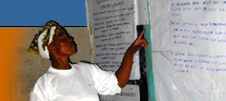|
||
 |

|
 |
|
|
A Death-and-Dying Future
Search Conference St. Michael's Maryland, USA, 1998: Last January, Bonnie Kasten and I worked together on a future search conference in St. Michael's, Maryland. Titled "Toward a Compassionate Community: A Talbot County Conference on Death and Dying," the search was designed to be the first step toward enhancing the community's ability to envision and create a place where those who are dying, and their loved ones, can be assured of greater compassion, caring, and service in all aspects of community life... to "grace the experience of death with dignity, compassion, and the full support of the personal and professional resources in the county." The Search was sponsored and organized by the Talbot Hospice Foundation, with cosponsorship by a health systems organization, the association of clergy and laity, and two businesses in the county. Approximately 85 people participated in the conference -- 85 people came to spend two days talking about death and dying! It was certainly one of the most moving searches I have experienced. It began with the executive director of the hospice reading from a letter written by a patient who had recently died. "This has been the best year of my life" began the letter, which described the last year of the patient's life, spent in the loving care of hospice and family. There was hardly a dry eye in the room.
Another one of Bonnie's innovations (new to me at least) was the use of a transcriber, a "miracle worker" who sat with a laptop and transcribed everything that was written on the wall, as well as on all flip charts, and even the mind map, printed it out, made copies, and had the first day's data back to participants by the second day. It created a truly memorable review of the search. Bonnie facilitated the search with a member of the community. I served as logistics manager, a third innovation. I had a team of three people, plus a few extras on part of day one, and together we "papered" the walls, organized the tables, moved flip charts, registered participants, helped with the food service, and did all of those endless little tasks that take up time and make the Search run so smoothly. There was nary a glitch! As always, and in spite of the solemn topic, the Future Scenarios created lots of laughter and energy. One group coined a new term, "menschkinism," the art of compassion, and instituted menschkinism training in all schools. Another group brought the "Okra" Winfrey show to Talbot County....land of pleasant living and tranquil dying....which had become the most popular spot in the country for people to die. There was a waiting list of people wanting to move in and individuals were asking to pay more taxes for the services. One person had written a new bestseller, The Seven Habits of Highly Effective Dying. And a new center was established, "Compassionate Choices," phone: 1-800-we-all-die, offering education, legal counseling, bereavement and financial counseling, and lobbying. And all individuals in the county, including children, were comfortable talking and feeling about death; it had been incorporated as a natural, spiritual part of life. "The only thing we have not been able to change," said one group, "is the Irish Wake." The Action Planning phase of the Search was the weakest, as people seemed to broaden their focus--feeling that they had to deal with such issues as crime, violence, and drugs--and became somewhat overwhelmed. Some initial plans were made, including the formation of a coordinating committee to oversee all of the new activities. And a strong bond seemed to be created between and among participants, having shared perspectives on this highly personal issue that clearly touches all of us in deep, meaningful ways. * * * * Bonnie Kasten adds: "I do agree that the action section was weak, but I'm pleased by the response of the initial planning committee, who are seeing a lot of changes already within the community and also a number of action teams forming on a number of tasks. We have a reconstituted team that is the communications clearinghouse and all is going along very well." |
|
|
|
home | introducing
the method | what is future search? | conditions for success | methodology |